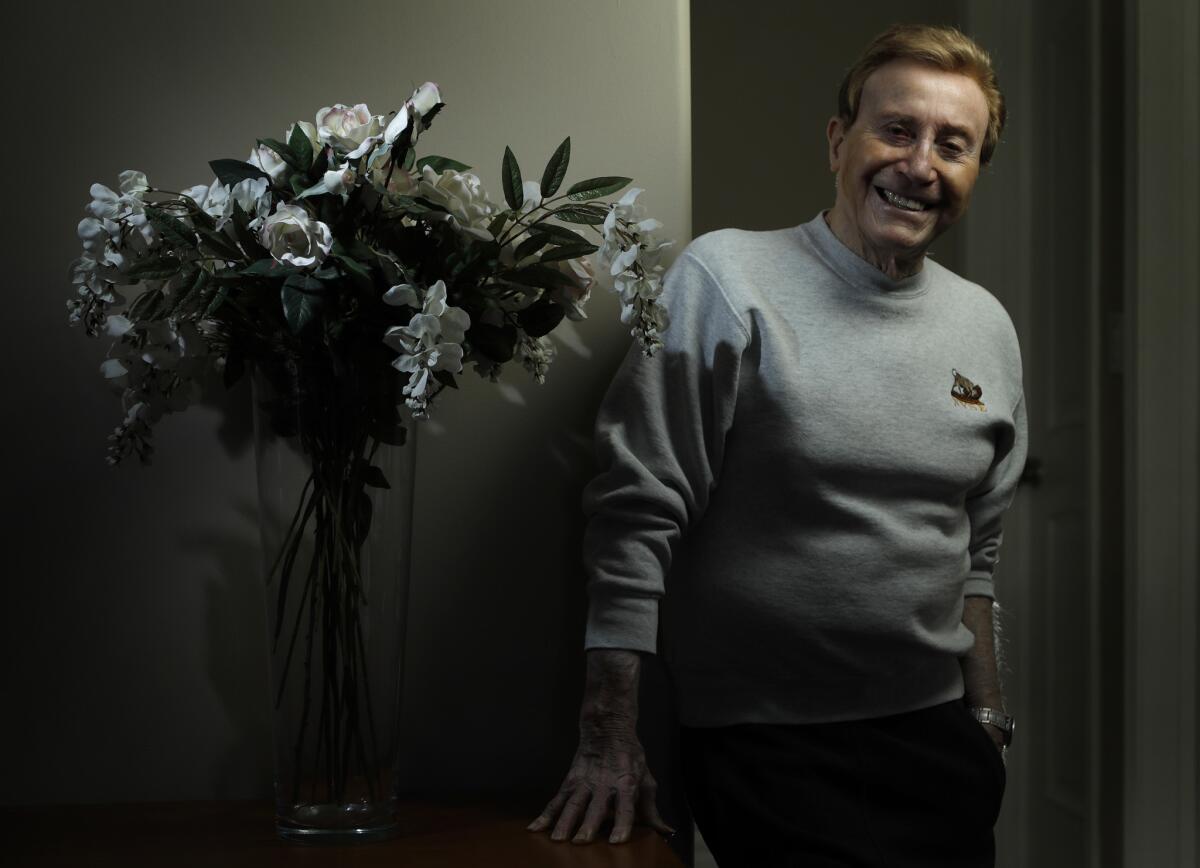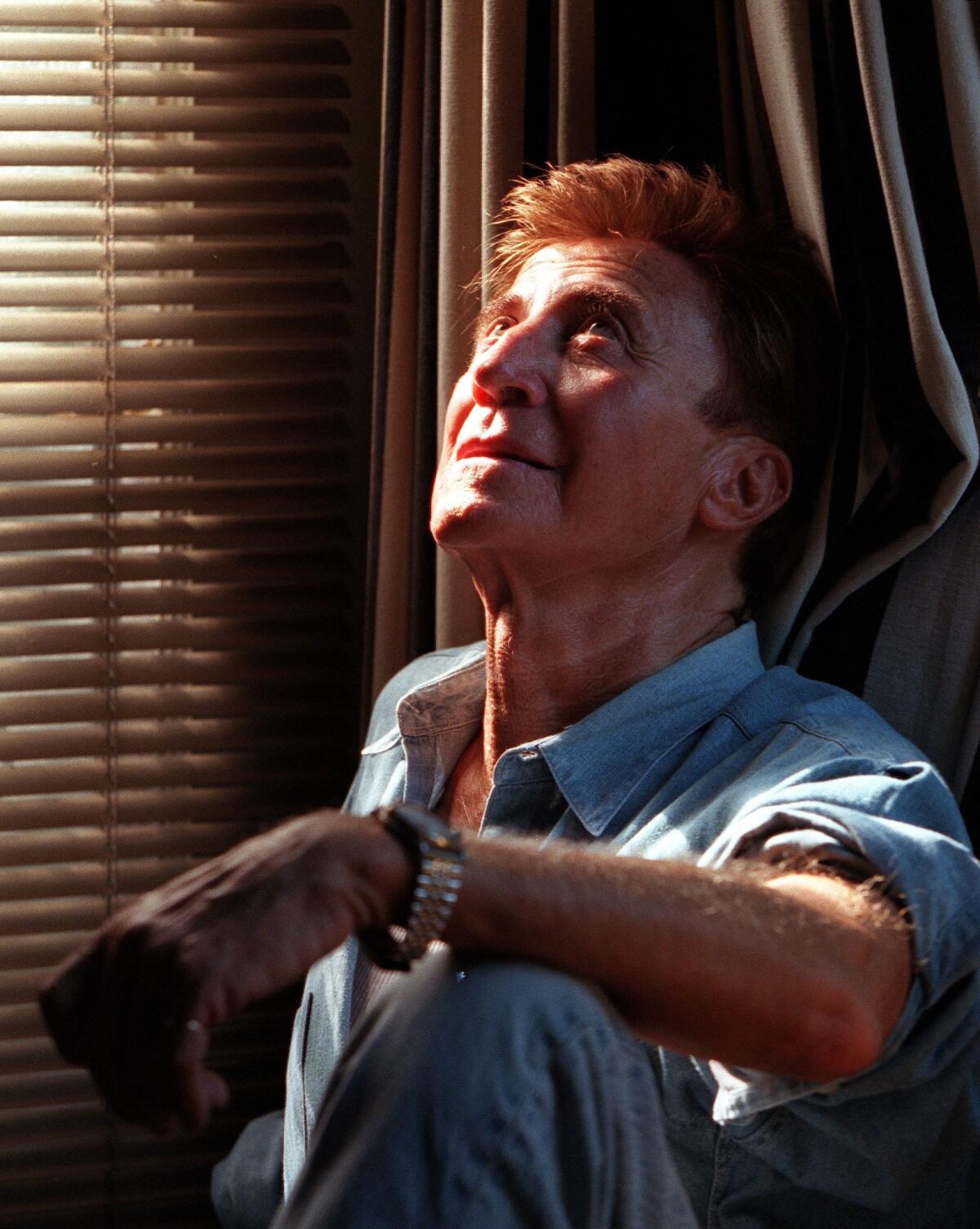John Rechy, a prophet of liberation

It’s a hot fall day. The bright blue sky, cloudless and indifferent, holds an air of volatility, as if the whole city is on edge, waiting for something terrifying and brilliant to happen. I have come to the home of author John Rechy. He lives at the end of a cul-de-sac in a quiet section of Encino. Getting out of my car, I pass rows of green and black trash bins, standing like sentinels along the street. It’s a beautiful neighborhood, with neatly trimmed lawns and well-kept houses. A pair of gardeners in workshirts and khaki pants sit under a tree.
‚ÄúBuenas tardes,‚ÄĚ they say.
‚ÄúHola,‚ÄĚ I reply back. ‚ÄúCon permiso.‚ÄĚ
Rechy and his mate Michael (he bristles at the term ‚Äúpartner‚ÄĚ or ‚Äúhusband‚ÄĚ) meet me at the door. Rechy‚Äôs handshake ‚ÄĒ like his writing, like his very life ‚ÄĒ is exact, tough, but tender at the same time. His stare is focused, nothing gets past him, and when he gives you that look, you want to linger there with him. At 87, he is still producing work.
‚ÄúAfter the Blue Hour‚ÄĚ was published last February by Grove Press. ‚ÄúThe novel is unflinching in its candor even as its events have a tantalizing aura of mystery,‚ÄĚ wrote Publisher‚Äôs Weekly; Kirkus Review called it ‚Äú[b]eautifully written.‚ÄĚ The novel won the 2018 Lambda Literary award for best gay fiction. He followed this up with ‚ÄúPablo!,‚ÄĚ a novel written years before his seminal 1963 breakthrough ‚ÄúCity of Night,‚ÄĚ which he published when he was in his thirties. Steeped in Mayan lore, ‚ÄúPablo!‚ÄĚ explores the often-fractured nature of identity and the inescapable human desire to reach out, to connect, and to belong to someone, or something, bigger than oneself.
It‚Äôs hard to imagine that the same writer who penned a book like ‚ÄúPablo!‚ÄĚ so many years ago also wrote works often banned for their graphic representations of ‚Äúdeviant‚ÄĚ lifestyles. He admits that re-reading ‚ÄúPablo!‚ÄĚ offers him an opportunity to ponder his conscious decision as a writer to explore form even back then. ‚ÄúThat‚Äôs very important to me. Structure and form and style,‚ÄĚ he says. ‚ÄúThere was always this terrible misreading of ‚ÄėCity of Night.‚Äô It‚Äôs a book that is consciously structured and fitted to the lived realities of the characters. This is only now being recognized.‚ÄĚ
As a graduate student of writing at UC Irvine, I struggled to find my own voice, struggled to find a language with which to tell the kinds of stories I knew that were in me to tell. Then I audited a course where the professor had assigned ‚ÄúCity of Night.‚ÄĚ I read the book in one sitting. It was like nothing I‚Äôd ever encountered.
Years prior, I had lived in the heart of Hollywood, not far from the streets Rechy‚Äôs ‚ÄúYoungman‚ÄĚ had roamed. My evenings were a blur of expensive cocktails at trendy bars and random encounters with anonymous men in dark alleys and seedy clubs. I had been utterly reckless and irresponsible with my health, my money and my sex life. I recall crying once I finished ‚ÄúCity of Night‚ÄĚ and thinking to myself, there I am. Right there. That want, that desire, that fevered lust had been mine too. And for the first time, here was an author giving me permission to be both a gay writer and a Chicano writer.
Rechy’s work resisted definitions, cast these aside, complicated the categories I’d come to believe were a necessity when it came to publishing. His very life is one of contrasts. He thrives within those sites of transaction and exchange, in the ephemeral twilight, where things get messy and jagged. I wanted to write from that thin strip of contradictions too.
‚ÄúI‚Äôve written better books than ‚ÄėCity of Night.‚Äô Yet it‚Äôs often as if I‚Äôve only done that one. People will say to me ‚ÄėI love your book.‚Äô‚ÄĚ Indeed, over a career that spans nearly five decades, Rechy has published 18 books. ‚ÄúYou realize that there are no depictions of graphic sex in ‚ÄėCity of Night‚Äô?‚ÄĚ
It was the impression of it, he continues, the very notion that a book can call attention to such a reality, that caused so much controversy. When ‚ÄúCity of Night‚ÄĚ was first published, the book received a generally negative reception; in his review of it for the New York Review of Books, Alfred Chester slammed the novel and called Rechy‚Äôs stories ‚Äúawful‚ÄĚ; it regularly makes the list of most banned books in America. Yet, if graphic sex is in short supply in his first published book, there‚Äôs plenty of it in others ‚ÄĒ ‚ÄúNumbers,‚ÄĚ ‚ÄúThe Sexual Outlaw‚ÄĚ and ‚ÄúThe Coming of Night.‚ÄĚ But there is also deep veneration for family, culture and religion at the core of his novels ‚ÄúOur Lady of Babylon‚ÄĚ and ‚ÄúThe Miraculous Day of Amalia G√≥mez,‚ÄĚ both of which center on strong female characters. Whether it‚Äôs porn megastar Amber or Chicano punk rocker Manny in ‚ÄúBodies and Souls‚ÄĚ or the singularly attractive Lyle in ‚ÄúThe Life and Adventures of Lyle Clemens,‚ÄĚ Rechy shines an incandescent light on those people always on the cusp of discovering their true nature, individuals perpetually exploring the folds and areas that are undefinable and unmapped. But what might appear as blurred boundaries to us are very clear to him. ‚ÄúI believe in freedom of expression and in looking at situations closely and with no censorship.‚ÄĚ He leans in, stretching his forearms, his broad shoulders flexing. ‚ÄúBut we must always be responsible and clear about our intentions.‚ÄĚ
In a 2013 New York Times interview, Rechy stated: ‚ÄúIt‚Äôs been more difficult for me to come out as a Mexican-American than come out as gay.‚ÄĚ Like his characters, his life flouts labels, rips them apart, and defiantly scatters the detritus for the rest of us to sort out. To Rechy, there is no gay or straight, no pre-Stonewall or post-Stonewall. ‚ÄúThat historic moment has come to be considered as the defining event. But a drag queen walking the streets of Los Angeles in the early ‚Äô60s was just as radical of an evidence of protest.‚ÄĚ He admits that, even at his age, he adamantly resists the harsh demarcations that slice and separate our experiences, that he continues waging a useless war against language. ‚ÄúThe word ‚Äėqueer‚Äô will always be an assault on those of my generation,‚ÄĚ he says. ‚ÄúWe confuse gay liberation with straight imitation. Straightness is our goal. This pushes us away from the uniqueness that is the gay experience.‚ÄĚ

Rechy sees what he calls ‚Äúthe impeccability of writing‚ÄĚ as a factor that inhibits young authors from excavating the kinds of stories this world desperately needs. For him, there‚Äôs a preoccupation with the politeness of the work that incapacitates many novelists ‚ÄĒ gay, straight, white, Chicana and Chicano. A careful avoidance of the more graphic depictions of life on the edges, he believes, dilutes writing. ‚ÄúFor example,‚ÄĚ he continues. ‚ÄúA sex scene should be written as carefully as the opening passage of the book. There should be no decline in the quality of the prose. It should be consistent, superbly described, and never vulgar. A restriction against the writing of sex thus becomes rarefied, polite, utterly ridiculous and filled with bad euphemisms like ‚Äėthe open flower or the ‚Äėrasping root.‚Äô‚ÄĚ He laughs. ‚ÄúNobody wants that.‚ÄĚ
In ‚ÄúThe Sexual Outlaw,‚ÄĚ he wrote, ‚ÄúIn this context [of rage and oppression] the sexual outlaw flourishes. The pressures produce him, create his defiance. Knowing that each second his freedom may be ripped away arbitrarily, he lives fully at the brink. Promiscuity is his righteous form of revolution.‚ÄĚ In Rechy‚Äôs skilled hands, under his penetrating gaze, we watch with patience and reverence, waiting for the next revolution to take hold.
Espinoza is the author of two novels. His next book, ‚ÄúCruising: An Intimate History of a Radical Pastime,‚ÄĚ will be published by Unnamed Press in June 2019.
More to Read
Sign up for our Book Club newsletter
Get the latest news, events and more from the Los Angeles Times Book Club, and help us get L.A. reading and talking.
You may occasionally receive promotional content from the Los Angeles Times.








